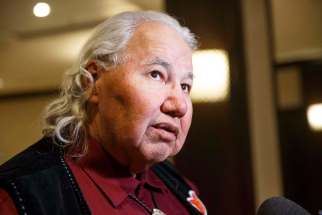Overhaul of police training is long overdue
Read this article for free:
or
Already have an account? Log in here »
To continue reading, please subscribe:
Monthly Digital Subscription
$0 for the first 4 weeks*
- Enjoy unlimited reading on winnipegfreepress.com
- Read the E-Edition, our digital replica newspaper
- Access News Break, our award-winning app
- Play interactive puzzles
*No charge for 4 weeks then price increases to the regular rate of $19.00 plus GST every four weeks. Offer available to new and qualified returning subscribers only. Cancel any time.
Monthly Digital Subscription
$4.75/week*
- Enjoy unlimited reading on winnipegfreepress.com
- Read the E-Edition, our digital replica newspaper
- Access News Break, our award-winning app
- Play interactive puzzles
*Billed as $19 plus GST every four weeks. Cancel any time.
To continue reading, please subscribe:
Add Free Press access to your Brandon Sun subscription for only an additional
$1 for the first 4 weeks*
*Your next subscription payment will increase by $1.00 and you will be charged $16.99 plus GST for four weeks. After four weeks, your payment will increase to $23.99 plus GST every four weeks.
Read unlimited articles for free today:
or
Already have an account? Log in here »
Hey there, time traveller!
This article was published 23/06/2021 (1634 days ago), so information in it may no longer be current.
You can’t do a job properly unless you’ve been adequately trained. And according to an advocacy group calling for sweeping change, it has been a long time since police training prepared law-enforcement personnel for the realities they face in their day-to-day duties.
“People have this idea of policing as dealing with crime and laying charges all day long. And we really don’t,” police constable Lisa Deveau, speaking for the Coalition for Canadian Police Reform (CCPR), told the Globe and Mail. “We deal with homelessness, we deal with addictions, we deal with mental health. And we’re not equipped for it.”
She makes an interesting point, whose validity is doubtless reinforced in interactions between police and the public in Winnipeg every day.
Ms. Deveau, who is currently on leave from a large municipal police force, is among the current and retired police-force members, academics, community organizers and physicians who have formed the CCPR in hopes of successfully lobbying for an overhaul of police training to make it better reflect the conditions officers face in 21st-century Canada.
Former Winnipeg Police Service chief David Cassels, who also supports the CCPR effort, called current entry-level police training “very traditional, very paramilitary” and “completely out of date.”
Among the group’s priorities is identifying, addressing and hopefully eliminating the biases and misconceptions in which police violence is too often deeply rooted. Such issues have been the subject of intense public discussion and forceful protest since the murder last year of African American George Floyd by a Minneapolis police officer.
The subsequent wave of Black Lives Matter protests and similarly themed demonstrations prompted calls to defund and dismantle policing as we know it; what has been less clear in the ongoing debate is how crime and the enforcement of laws might be addressed in the aftermath of such a deconstructive initiative. The CCPR’s position is that what’s needed is not the abolition of police, but the establishment of higher standards for police training and conduct.
Former Winnipeg Police Service chief David Cassels, who also supports the CCPR effort, called current entry-level police training “very traditional, very paramilitary” and “completely out of date.” He added that there’s “barely any training” on such issues as racism, diversity, mental illness and the impacts of colonization on Indigenous people.
The group is calling for the establishment of national standards for police training in Canada, an admirable goal that might prove difficult to accomplish as individual jurisdictions would undoubtedly fight to maintain local control over law-enforcement standards and practices. But regardless of whether the change comes as a result of federal mandate or province-by-province, city-by-city recalibration, what’s clear is that the massive overhaul being touted by the CCPR is both urgently required and long overdue.

Equally relevant to the discussion is the perspective of another Manitoban — recently retired senator Murray Sinclair — who asserts that the reform of policing in Canada depends not just on how officers are trained, but also on who is hired to serve as police officers.
Mr. Sinclair told the Globe the process of recruiting police lacks sufficient safeguards to ensure those with pre-existing racist attitudes are rooted out: “Many forces think that they can train police officers to have good character, or that people will clear their thinking of racist ideology, when in fact much of that is already embedded by their own experiences or their own public education.”
In other words, you can’t do the job without proper training, but there’s also no guarantee access to proper training will make you the right person for the job.
Police reform, necessary as it is, will not be easily achieved.






